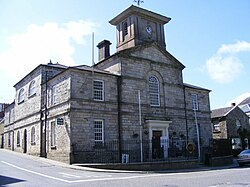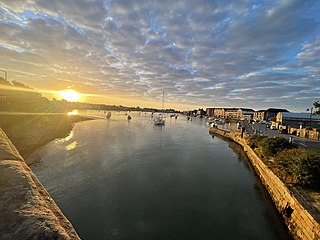
Dungarvan is a coastal town and harbour in County Waterford, on the south-east coast of Ireland. Prior to the merger of Waterford County Council with Waterford City Council in 2014, Dungarvan was the county town and administrative centre of County Waterford. Waterford City and County Council retains administrative offices in the town. The town is in a townland and civil parish of the same name.
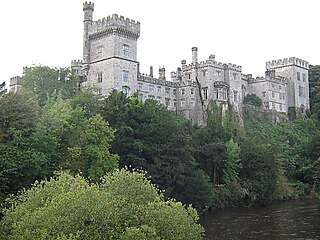
Lismore is a historic town in County Waterford, in the province of Munster, Ireland. Originally associated with Saint Mochuda of Lismore, who founded Lismore Abbey in the 7th century, the town developed around the medieval Lismore Castle. As of the 21st century, Lismore supports a rural catchment area, and was designated as a "district service centre" in Waterford County Council's 2011–2017 development plan. As of 2022, the town had a population of 1,347 people.

Waterford County Council was the authority responsible for local government in County Waterford, Ireland. The remit of Waterford County Council also included some suburbs of the Waterford city not within the remit of Waterford City Council. As a county council, it was governed by the Local Government Act 2001.

The Belmont County Courthouse is located at 101 West Main Street in St. Clairsville, Ohio, United States. It sits on the highest point in the St. Clairsville area and is thus visible from Interstate 70 and many other points in the Ohio Valley. It is a contributing property in the St. Clairsville Historic District, which was added to the National Register of Historic Places in 1969.

The DeKalb County Courthouse is located in the county seat of DeKalb County, Illinois, U.S., the city of Sycamore. The Classical Revival structure sits on a square facing Illinois Route 64 as it passes through the city. The current courthouse was constructed in 1905 amid controversy over where the courthouse and thus, ultimately, the county seat would be located. The current building is the third structure to bear the name "DeKalb County Courthouse." DeKalb County's Courthouse still serves as the county's primary judicial center and is a contributing property to the Sycamore Historic District. The district joined the National Register of Historic Places in 1978. As the county's primary courthouse for over 100 years, the site has been host to many trials, including prominent murder cases.

The Hawkins County Courthouse is the seat of county government for Hawkins County, Tennessee, United States, located in the city of Rogersville. It was built in 1836, it is one of six antebellum courthouses still in use in Tennessee, and it is the second oldest courthouse still in use in the state.

The Cuyahoga County Courthouse stretches along Lakeside Avenue at the north end of the Cleveland Mall in downtown Cleveland, Ohio. The building was listed on the National Register along with the mall district in 1975. Other notable buildings of the Group Plan are the Howard M. Metzenbaum U.S. Courthouse designed by Arnold Brunner, the Cleveland Public Library, the Board of Education Building, Cleveland City Hall, and Public Auditorium.

The Shire Hall, Monmouth, Wales, is a prominent building on Agincourt Square in the town centre. It was built in 1724, and was formerly the centre for the assize courts and quarter sessions for Monmouthshire. The building was also used as a market place. In 1839–40, the court was the location of the trial of the Chartist leader John Frost and others for high treason for their part in the Newport Rising.

Dungarvan Town Council, previously known as Dungarvan Urban District Council, was responsible for administration and some public services in Dungarvan, County Waterford. Records date the establishment of town commissioners in Dungarvan to 1855, being replaced by an urban district council in 1899. Later becoming a town council, the local administrative body was abolished in 2014 as part of reforms under the Local Government Reform Act 2014.

Waterford Suir Valley Railway (WSVR) is a registered charity operating on a 3 ft gauge railway track from Kilmeadan back towards Bilberry outside Waterford, Ireland.The line shares much of its route along the banks of River Suir with the Waterford Greenway. This walking and cycle path passes through the station which has car parking and a coffee shop for visitors.

Cork Courthouse is a judicial facility in Washington Street, Cork, Ireland. It serves as the Cork Court Office in civil and family related matters, while the courthouse on Anglesea Street handles criminal trials. It operates on the level of both the District and Circuit Courts. The courthouse occupies the entire block between Washington Street, Liberty Street, Cross Street and Courthouse Street.

Waterford Courthouse is a judicial facility in Catherine Street, Waterford, County Waterford, Ireland.
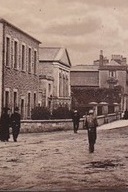
Dungarvan Courthouse is a judicial facility in Meagher Street, Dungarvan, County Waterford, Ireland.

Wakefield Town Hall is a municipal building in Wood Street in Wakefield, West Yorkshire, England. It remains a venue for weddings and civil partnerships but is no longer the headquarters of Wakefield Council which is now based at County Hall. The town hall is a Grade I listed building.

Maidstone Town Hall is a municipal building in Middle Row, Maidstone, Kent, England. The town hall, which is a meeting place of Maidstone Borough Council, is a Grade II* listed building.

Whitehaven Town Hall is a municipal building in Duke Street in Whitehaven, Cumbria, England. The building, which was the headquarters of Whitehaven Borough Council, is a Grade II listed building.

Tetbury Market House, also known as Tetbury Town Hall, is a municipal building in the Market Place, Tetbury, Gloucestershire, England. The building, which was used both as a market house and as a town hall until the late 19th century, is a Grade I listed building.

Ballynahinch Market House, formerly known as Ballynahinch Court House and as Ballynahinch Town Hall, is a municipal structure in the Market Square, Ballynahinch, County Down, Northern Ireland. The structure, which is used as a community events venue, is a Grade B1 listed building.
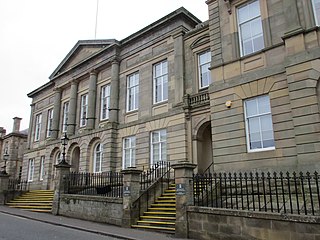
Lanark Sheriff Court is a judicial building in Hope Street, Lanark, South Lanarkshire, Scotland. The building, which continues to serve as the local courthouse, is a Category B listed building.

Ludlow Guildhall is a historic building in Mill Street in Ludlow, a town in Shropshire, in England. The building, which accommodates the offices and meeting place of Ludlow Town Council, is a Grade I listed building.
